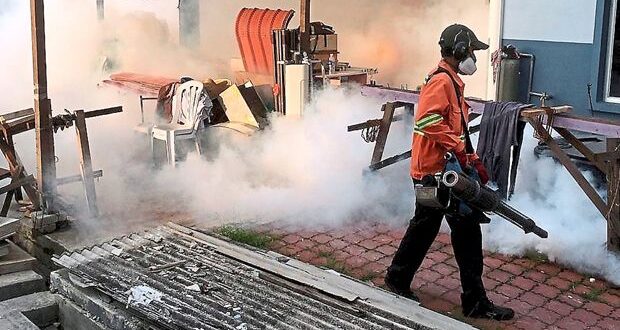WITH homes, schools and other buildings left unattended during the balik kampung exodus, authorities fear a possible surge in dengue cases in Klang.
Klang Royal City Council (MBDK) Health director Azmi Muji said that with many returned to their hometowns for Hari Raya Aidilfitri, empty houses and premises could become mosquito breeding sites.
“Stagnant water in pails, bathing tubs and vases along with accumulated rainwater in containers around the house can be places for Aedes mosquitoes to lay eggs,” he said.
Azmi said Klang had recorded 3,474 dengue cases as of April 7, with one fatality this year.
This is an increase of 514 cases compared to the corresponding period of last year’s cumulative total of 2,960 cases. There was no fatality in 2023.
Klang has seen 248 cases weekly on average since the start of the year.
Of the 11 areas in the city, Sentosa had 610 cases followed by Meru (507), Kota Kemuning (480), Sementa (463), Bandar Baru Klang (367), Port Klang (345), Sungai Kandis (231), Selat Klang (228), Pandamaran (203), Kota Anggerik (20) and Batu Tiga (20).
According to Selangor Health Department, an Aedes mosquito could hatch into larva in less than a day if conditions are conducive. It then takes about six days before becoming an adult mosquito.
Azmi said the other main concern was with schools, which would be closed for nine days from April 6.
He said mosquitoes might also lay eggs in the still water in toilet bowls.
“Just one container with some water in the house or at school can be the breeding ground for Aedes mosquitoes.
“MBDK urges the public to immediately remove stagnant water at houses, offices and school premises after returning from holiday.
“Most times, people unknowingly leave some water in the water dispenser tray in the office or in pails in the school toilet,” said Azmi.
He said the risk of dengue hotspots emerging would continue because of environmental factors too, such as hot weather with intermittent rains.
Dengue hotspots are areas with outbreaks for more than 30 days.
Azmi called for collective community action and vigilance to curb the surge in dengue cases.
“Residents living in dengue hotspots should take immediate action to suppress the Aedes mosquito population and help break disease transmission,” he said.
Klang’s current hotspots are Taman Daya Maju (Jalan Abadi 10) in Meru, Kampung Rantau Panjang (Jalan Telok Kapas) in Sementa, Pangsapuri Rebana in Bandar Baru Klang and Flat Batu Nilam 34 in Sentosa.
MBDK senior health inspector Zakaria Ismail also welcomed a public initiative called Community Free of Aedes, where people were encouraged to spend 10 minutes a week to clean up their surroundings.
Classic symptoms of dengue include high fever, headache, body ache, weakness, vomiting, sore throat, and rash.
 BeritaKini.biz Berita Viral Terkini di Malaysia
BeritaKini.biz Berita Viral Terkini di Malaysia





